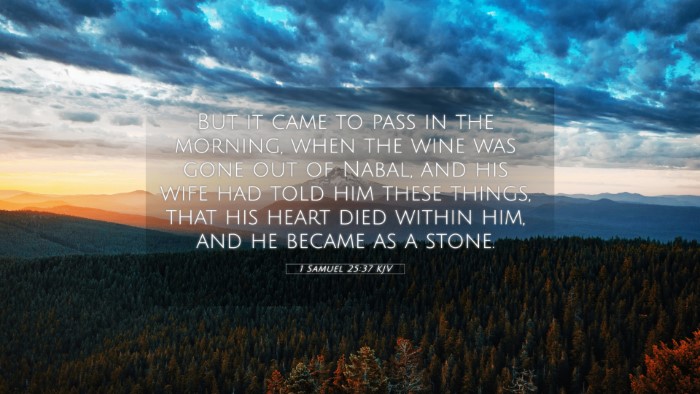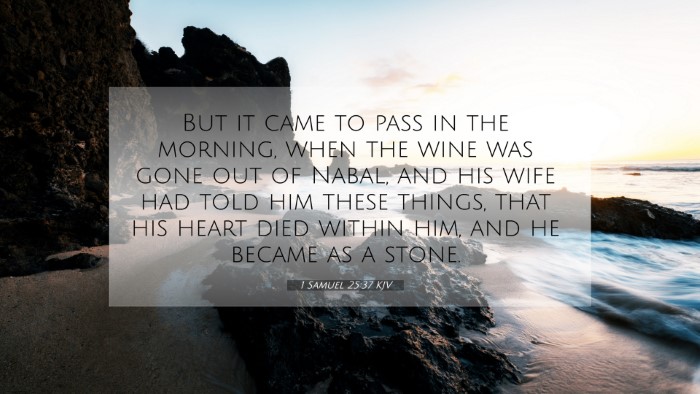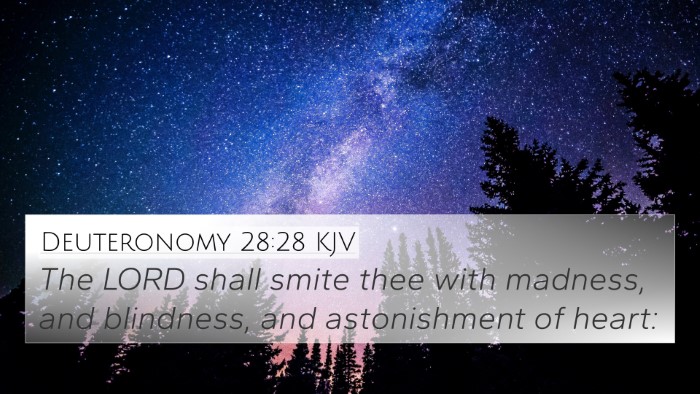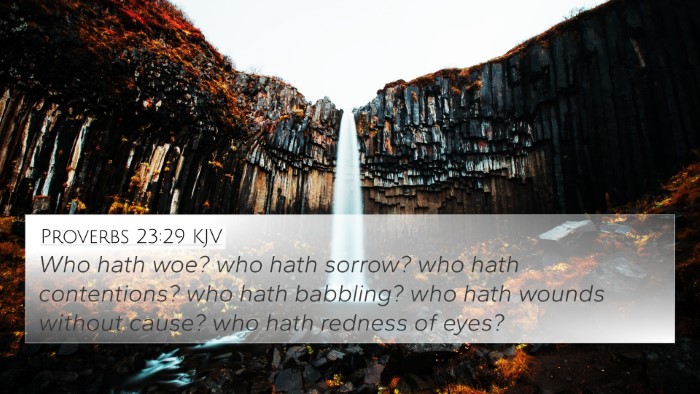Understanding 1 Samuel 25:37
In 1 Samuel 25:37, we encounter a key moment in the narrative surrounding Abigail and Nabal. After Abigail informs her husband about the gifts she provided to David, Nabal's reaction shifts dramatically. The verse states:
"But it came to pass in the morning, when the wine was gone out of Nabal, and his wife had told him these things, that his heart died within him, and he became as a stone." (1 Samuel 25:37, KJV)
Summarized Meaning
This passage illustrates a profound transformation in Nabal's demeanor after Abigail reveals the gravity of his actions concerning David. Several commentaries provide insights into the implications of this verse:
-
Matthew Henry's Commentary:
Henry emphasizes Nabal's folly and arrogance, showcasing how his indulgent lifestyle blinds him to the imminent dangers. The loss of his spirit serves as a divine judgment against his immoral actions, highlighting God's sovereignty and justice.
-
Albert Barnes' Notes:
Barnes interprets the phrase "his heart died within him" as a metaphor indicating not just physical distress but profound remorse and terror at the consequences of his actions. It serves as a warning about the perils of pride and foolishness, as folly can lead to one’s downfall.
-
Adam Clarke's Commentary:
Clarke notes Nabal's state as an indication of a severe psychological reaction to the revelation of truth. He draws parallels to instances where the unsettling revelation of one’s sins leads to despair, reminding readers of the need for humility and repentance.
Thematic Connections
This verse opens discussions around several themes, including:
- **Folly and its Consequences:** Nabal's foolishness drives home the point that living in arrogance can lead to dire spiritual and moral failures.
- **The Role of Women in Biblical Narratives:** Abigail's wisdom contrasts sharply with Nabal’s ignorance, emphasizing the importance of discernment and prudence.
- **Divine Justice:** The immediate repercussions of Nabal’s actions reflect God’s pervasive justice, serving both as a warning and a lesson for readers.
Bible Verse Cross-References
To fully appreciate the depth of 1 Samuel 25:37, it is crucial to explore its connections with other scripture. Below are key verses related to this passage:
- Proverbs 16:18: “Pride goes before destruction, and a haughty spirit before a fall.” – highlights the dangers of arrogance similar to Nabal's attitude.
- James 4:6: “But he gives more grace. Therefore it says, ‘God opposes the proud but gives grace to the humble.’” – illustrates God's opposition to pride, relevant to Nabal's fate.
- 1 Samuel 25:3: Describes Nabal as "churlish and evil in his doings," establishing his character early in the narrative.
- 1 Peter 5:5: “Likewise, you younger people, submit yourselves to your elders. Yes, all of you be submissive to one another, and be clothed with humility, for ‘God resists the proud, but gives grace to the humble.’” – echoes the theme of humility over pride in context to Nabal's arrogance.
- Psalm 107:43: “Whoever is wise will observe these things, and they will understand the lovingkindness of the Lord.” – connects understanding discernment with experiencing God's blessings.
- Galatians 6:7: “Do not be deceived: God is not mocked, for whatever a man sows, that he will also reap.” – reinforces the idea of divine retribution akin to Nabal's outcome.
- Job 18:14: On losing hope, akin to Nabal’s dismay—“His confidence is rooted in the dust.”
Conclusion
1 Samuel 25:37 serves as a poignant reminder of the consequences that arise from poor judgment and pride. The insights drawn from respected commentaries enhance our understanding of this verse while the cross-references provide an extensive inter-Biblical dialogue that enriches the study of related themes in the scripture.
As we reflect on these meanings, it is essential to delve deeper into the connections between Bible verses, recognizing how they inform and illuminate one another, forming a cohesive narrative of faith and wisdom.







